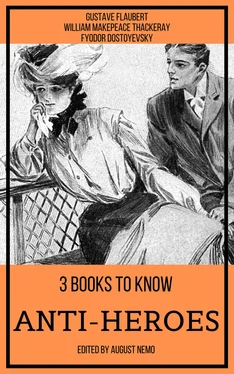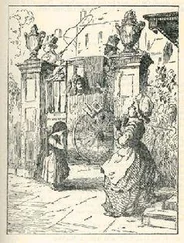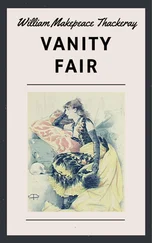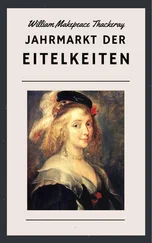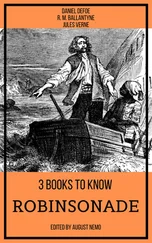It was hither we came after the Mannheim misfortune. The nobility of the Court were pleased to say our reputation had preceded us, and the two Irish gentleman were made welcome. The very first night at Court we lost 740 of our 800 louis; the next evening, at the Court Marshal’s table, I won them back, with 1300 more. You may be sure we allowed no one to know how near we were to ruin on the first evening; but, on the contrary, I endeared every one to me by my gay manner of losing, and the Finance Minister himself cashed a note for 400 ducats, drawn by me upon my steward of Ballybarry Castle in the kingdom of Ireland; which very note I won from his Excellency the next day, along with a considerable sum in ready cash. In that noble Court everybody was a gambler. You would see the lacqueys in the ducal ante-rooms at work with their dirty packs of cards; the coach and chair men playing in the court, while their masters were punting in the saloons above; the very cook-maids and scullions, I was told, had a bank, where one of them, an Italian confectioner, made a handsome fortune: he purchased afterwards a Roman marquisate, and his son has figured as one of the most fashionable of the illustrious foreigners in London. The poor devils of soldiers played away their pay when they got it, which was seldom; and I don’t believe there was an officer in any one of the guard regiments but had his cards in his pouch, and no more forgot his dice than his sword-knot. Among such fellows it was diamond cut diamond. What you call fair play would have been a folly. The gentlemen of Ballybarry would have been fools indeed to appear as pigeons in such a hawk’s nest. None but men of courage and genius could live and prosper in a society where every one was bold and clever; and here my uncle and I held our own: ay, and more than our own.
His Highness the Duke was a widower, or rather, since the death of the reigning Duchess, had contracted a morganatic marriage with a lady whom he had ennobled, and who considered it a compliment (such was the morality of those days) to be called the Northern Dubarry. He had been married very young, and his son, the Hereditary Prince, may be said to have been the political sovereign of the State: for the reigning Duke was fonder of pleasure than of politics, and loved to talk a great deal more with his grand huntsman, or the director of his opera, than with ministers and ambassadors.
The Hereditary Prince, whom I shall call Prince Victor, was of a very different character from his august father. He had made the Wars of the Succession and Seven Years with great credit in the Empress’s service, was of a stern character, seldom appeared at Court, except when ceremony called him, but lived almost alone in his wing of the palace, where he devoted himself to the severest studies, being a great astronomer and chemist. He shared in the rage then common throughout Europe, of hunting for the philosopher’s stone; and my uncle often regretted that he had no smattering of chemistry, like Balsamo (who called himself Cagliostro), St. Germain, and other individuals, who had obtained very great sums from Duke Victor by aiding him in his search after the great secret. His amusements were hunting and reviewing the troops; but for him, and if his good-natured father had not had his aid, the army would have been playing at cards all day, and so it was well that the prudent prince was left to govern.
Duke Victor was fifty years of age, and his princess, the Princess Olivia, was scarce three-and-twenty. They had been married seven years, and in the first years of their union the Princess had borne him a son and a daughter. The stern morals and manners, the dark and ungainly appearance, of the husband, were little likely to please the brilliant and fascinating young woman, who had been educated in the south (she was connected with the ducal house of S—-), who had passed two years at Paris under the guardianship of Mesdames the daughters of His Most Christian Majesty, and who was the life and soul of the Court of X—-, the gayest of the gay, the idol of her august father-in-law, and, indeed, of the whole Court. She was not beautiful, but charming; not witty, but charming, too, in her conversation as in her person. She was extravagant beyond all measure; so false, that you could not trust her; but her very weaknesses were more winning than the virtues of other women, her selfishness more delightful than others’ generosity. I never knew a woman whose faults made her so attractive. She used to ruin people, and yet they all loved her. My old uncle has seen her cheating at ombre, and let her win 400 louis without resisting in the least. Her caprices with the officers and ladies of her household were ceaseless: but they adored her. She was the only one of the reigning family whom the people worshipped. She never went abroad but they followed her carriage with shouts of acclamation: and, to be generous to them, she would borrow the last penny from one of her poor maids of honour, whom she would never pay. In the early days her husband was as much fascinated by her as all the rest of the world was; but her caprices had caused frightful outbreaks of temper on his part, and an estrangement which, though interrupted by almost mad returns of love, was still general. I speak of her Royal Highness with perfect candour and admiration, although I might be pardoned for judging her more severely, considering her opinion of myself. She said the elder Monsieur de Balibari was a finished old gentleman, and the younger one had the manners of a courier. The world has given a different opinion, and I can afford to chronicle this almost single sentence against me. Besides, she had a reason for her dislike to me, which you shall hear.
Five years in the army, long experience of the world, had ere now dispelled any of those romantic notions regarding love with which I commenced life; and I had determined, as is proper with gentlemen (it is only your low people who marry for mere affection), to consolidate my fortunes by marriage. In the course of our peregrinations, my uncle and I had made several attempts to carry this object into effect; but numerous disappointments had occurred which are not worth mentioning here, and had prevented me hitherto from making such a match as I thought was worthy of a man of my birth, abilities, and personal appearance. Ladies are not in the habit of running away on the Continent, as is the custom in England (a custom whereby many honourable gentlemen of my country have much benefited!); guardians, and ceremonies, and difficulties of all kinds intervene; true love is not allowed to have its course, and poor women cannot give away their honest hearts to the gallant fellows who have won them. Now it was settlements that were asked for; now it was my pedigree and title-deeds that were not satisfactory: though I had a plan and rent-roll of the Ballybarry estates, and the genealogy of the family up to King Brian Boru, or Barry, most handsomely designed on paper; now it was a young lady who was whisked off to a convent just as she was ready to fall into my arms; on another occasion, when a rich widow of the Low Countries was about to make me lord of a noble estate in Flanders, comes an order of the police which drives me out of Brussels at an hour’s notice, and consigns my mourner to her chateau. But at X—-I had an opportunity of playing a great game: and had won it too, but for the dreadful catastrophe which upset my fortune.
In the household of the Hereditary Princess there was a lady nineteen years of age, and possessor of the greatest fortune in the whole duchy. The Countess Ida, such was her name, was daughter of a late Minister and favourite of his Highness the Duke of X—-and his Duchess, who had done her the honour to be her sponsors at birth, and who, at the father’s death, had taken her under their august guardianship and protection. At sixteen she was brought from her castle, where, up to that period, she had been permitted to reside, and had been placed with the Princess Olivia, as one of her Highness’s maids of honour.
Читать дальше
